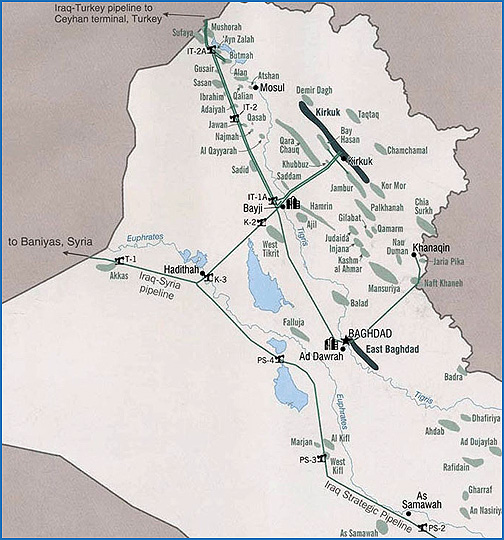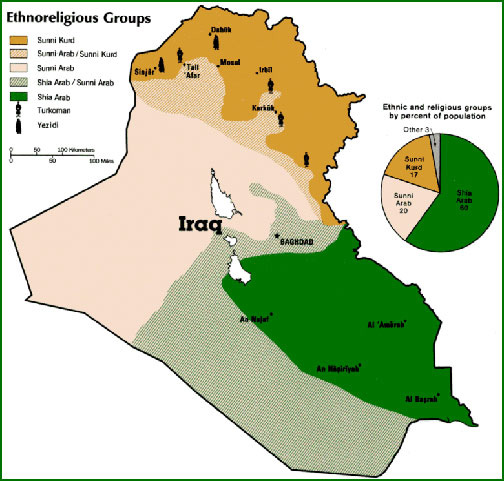The Surge: What Happens If The Spigot Is Broken? genre: Just Jihad & Polispeak
If you want to understand the grim situation in Iraq, you need to read the following excerpt...at least once...maybe twice. Keep in mind that we're talking about the oil produced in the Kurdish region of Iraq...the region that is almost always referred to as the most secure and peaceful region in Iraq. Unfortunately, getting that oil out of the area is a much different dynamic.
Persistent acts of sabotage to that pipeline [Iraq-Turkey] have shut down Iraq's northern oil exports for most of the time barring a few days since the U.S.-led invasion.
So the bottom line is that oil has only flowed through this key pipeline "a few days" in well over four years of American occupation. Now take a look at the rest of the story...it gets even better (and in this instance "better" means much worse).
From CNN (cont.):
AMMAN (Dow Jones) Unknown attackers have blown up part of an Iraqi pipeline that pumps crude oil from Kirkuk oil fields to the Turkish export terminal, Ceyhan, a senior Iraqi oil official and a shipping agent said Wednesday.
"The pipeline was attacked and damaged Tuesday," the official told Dow Jones Newswires by telephone from Baghdad.
The attack took place in the section of the pipeline connecting the oil-rich city of Kirkuk to the Baiji, home to Iraq's largest oil refinery. Iraq usually pumps Kirkuk crude oil to the refinery, 250 kilometers north of Baghdad, which takes what it needs before it pumps the rest to Ceyhan.
The official said the pipeline blast was "catastrophic" as it caused huge quantities of crude oil to spill into the Tigris River.
The latest incident hits Iraq's Oil Minister Hussein al-Shahristani's bid to resume sustainable exports from Iraq's northern oil fields after adopting new security measures to guard the export pipeline.
While I'm no expert on the oil industry in Iraq, some basic thoughts crossed my mind upon reading this article. First, in noting that the exporting of oil from the northern fields has been at a virtual standstill since we invaded Iraq, one has to determine the motivations which may be leading to the repetitive destruction of this pipeline.
To ascertain those reasons, we first have to acknowledge that the bulk of the oil produced in Kirkuk has been sent south to a refinery located north of Baghdad (an area that is heavily Sunni)...apparently supplying the oil needed for internal consumption and then intending to pump any excess oil to Ceyhan from that location.
The truth is that the line to Ceyhan was just made operational less than a month ago...creating the first meaningful pumping of oil to the area in years. With this latest sabotage, hopes to reestablish a dependable flow to this important export point have been dashed. To understand the magnitude of this disaster and its relevance to the revised U.S. strategy, one must review the efforts which went into restoring the pipeline.
The following excerpts are from an article announcing the restoration of oil flow through the pipeline to Ceyhan. The article touts the fact that the pipeline had been tested and was ready to begin sending oil to Ceyhan. More importantly, the article heralds a new security force designed to halt the ongoing incidents of sabotage.
From Qatar's The Peninsula 08/22/07:
DAMASCUS • Iraq is preparing to resume oil exports through Turkey in a few weeks through a new pipeline built in the midst of violence to help handle the flows, Oil Minister Hussain al-Shahristani said yesterday.
Crews have finished testing a 500,000-barrel per day pipeline covering a section of the northern export route and a special security force numbering thousands is being deployed to guard the network, Shahristani said.
“We have executed construction in a region practically on fire and we now have a bigger margin for manoeuvre as far as countering sabotage," Shahristani said.
“The tests have been successful and the new security force is a different breed from the corrupt one of old," he said on a visit to Damascus as a member of an Iraqi delegation negotiating improving ties with the Syrian government.
Let's step back even further and look at some of the history since the U.S. invasion and prior to the repair of the pipeline. From the excerpts below, it is clear that sectarian issues have hampered efforts to export oil to the North through this particular pipeline.
Additionally, the refinery from which this pipeline originates is plagued with issues of corruption and theft...all of which serve to hinder efforts to restore export levels necessary to insure the financial stability of Iraq. Absent that revenue stream, it is difficult to imagine a nation which can become self-sustaining.
From Energy Publisher 09/14/07:
Baiji: Iraq’s two largest sister refineries in north-central Iraq (with 310,000 bbl/d capacity) is a point of sectarian contention as the facility currently processes crude from the northern fields, but is located in nominally non-Kurdish territory. In January 2007, Iraqi Deputy Prime Minister Barham Saleh reported to Parliament that the country is losing $1.5 billion annually from attacks and theft at Baiji. The facility has been subject to repeated disruptions and power loss, and generally operates at around 75 percent capacity. The January 2007 SIGIR report indicated that at least some of the oil storage facilities were under “insurgent control" as of December 2006.
Iraq’s inability to secure crude pipelines in the north has meant that exports are generally routed through the southern port of Basrah.
According to IRMO/ITAO, crude oil exports have fallen from a post-war high of around 2.0 million bbl/d in 2004, to an average of 1.5 million bbl/d in 2006.
However, there is some marginal improvement recently mainly due to the intermittent ability to export crude through a northern pipeline, and improved loading capabilities in Basrah. In June 2007, Iraq issued its first tender in almost six months to sell Kirkuk oil.
In the north, the major international crude oil pipeline is the 1.1 million-bbl/d capacity Kirkurk-Ceyhan (Iraq-Turkey) pipeline. This pipeline and its 480,000-bbl/day sister-installation have been subject to repeated attacks and function intermittently, particularly in the Beyji-Fatha area. The KRG is reportedly considering building another pipeline that avoids unfortified areas. The inability to export oil through this pipeline has severely limited exports from the northern fields.
So all the anticipation (positive spin) which has been disseminated prior to today's "catastrophic" blast seems to have been overly optimistic. At the end of the day, the hopes and efforts to restore this pipeline...and therefore increase oil exports...have been dashed. While too early to determine, the interruption may also limit the ability of Iraq to negotiate further tender offers. The impact must be analyzed and viewed in its proper context.
As one attempts to understand the effectiveness of the latest U.S. troop surge, there are many relevant considerations. What is the likelihood that it can achieve the established benchmarks as well as prevent significant setbacks of this nature? How does one determine if the recent analysis provided by the Bush administration can be trusted to be accurate and impartial? What can be gleaned from catastrophic events similar to this one...especially when seeking to gauge the potential for a political reconciliation capable of extinguishing the unrest and defining a path to viability...both politically and economically?
If the restoration of sufficient oil production and higher exports have been ignored or inadequately safeguarded in order to focus on restoring some level of security in Baghdad, what has actually being achieved? Aren't both of these issues essential priorities? Beyond that, how many other issues may be simmering and on the verge of erupting?
Perhaps I'm far too cynical, but as I read about today's event...and then did some added research...I couldn't help but feel like the American public is being drawn further into a deadly game of paint ball...wearing unusually large blinders and rose colored glasses...in a room where the light has been suspiciously dimmed. Thinking ahead, even if we're able to eventually extricate ourselves from this fiasco, I have no idea how we'll be able to wash away the inevitably messy stains.
Tagged as: Ceyhan, Iraq, Kirkuk, Kurds, Oil Exports, Petraeus Report, Sectarian Conflict, Sunni's, Troop Surge


Post a comment